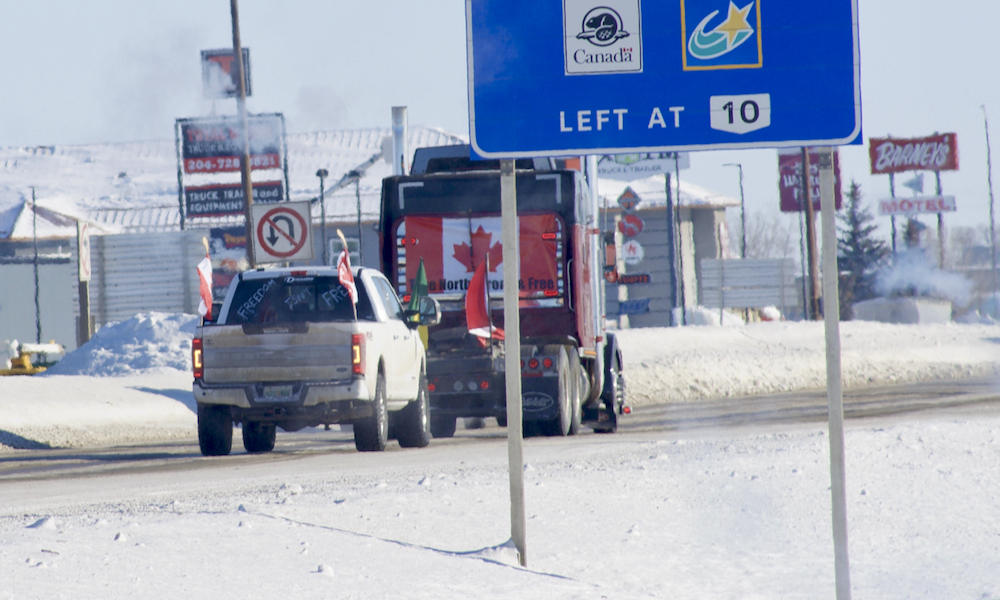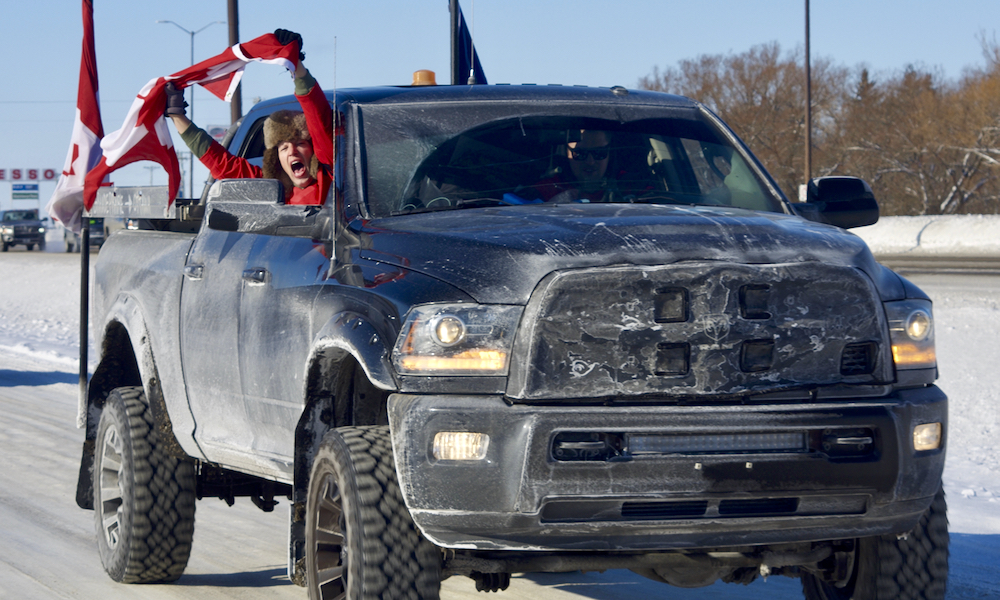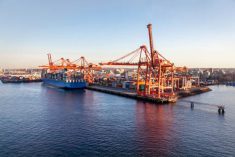Some Manitoba farmers have joined or otherwise supported the cross-Canada truck convoy to protest vaccine mandates. The convoy arrived in Manitoba Jan. 25 on its way to Ottawa.
Why it matters: Sectors including the pork industry have felt the transportation pinch from recently introduced vaccine mandates for international truckers, and some farmers have thrown support behind the convoy as a more general statement of protest.
The convoy protest was initially a reaction to vaccine mandates for commercial truckers at the Canada-U.S. border. As of Jan. 15, the federal government required all non-Canadian truckers to be fully vaccinated to enter Canada, while unvaccinated or partly vaccinated Canadian drivers would have to undergo testing and quarantine upon their return north.
Read Also

Students push for Manitoba road upgrades
Manitoba’s lack of higher-rated RTAC roads creates irritating highway detours and weight restrictions for farmers, University of Manitoba students told KAP.
A week later, the U.S. imposed a similar vaccine mandate for commercial drivers entering that country.
Before coming into force, the Canadian Truckers Alliance estimated the mandate would take 10 to 15 per cent of drivers off the international route.
Bill Rempel of Steve’s Livestock Transport said he didn’t think any of his firm’s trucks were in the convoy but the company did advocate against the vaccine mandate.
“We want our governments to make good policies that are sound and with truck drivers, they’re among the most physically distanced truck workers that are out there,” he said.
“We just didn’t see the need for there to be a change, simply to disrupt the supply chain, and we’ve seen that disruption in the supply chain.”
He said the company has struggled to meet demands for normal cross-border movement.

Compounding factor
Transportation issues, domestically and at the border, arose in the weeks before the vaccine mandate came into effect. Transportation was among the sectors hit by staffing shortages as more people fell ill with COVID-19. In the pork sector, those challenges were compounded by the province’s ongoing outbreak of porcine epidemic diarrhea, which created even more labour demand for tasks including disinfection.
Cam Dahl, general manager of the Manitoba Pork Council, said there were international shipment issues before the mandate. Live animal shipments heading south were cancelled or delayed, and sourcing soymeal from the U.S. has become a significant issue.
“We were going into this period with a supply chain that was already very strained, where trucks and drivers were in very tight supply,” Dahl said. “This is why some of these issues are a significant concern, because if you have a system that is already under significant strain, and then you start pulling additional pieces out of that, of course that has a much larger impact than if we were fully stocked, as it were, to start with.”
Livestock transport is also a specialization in the already constrained labour pool, he added, and driver shortages have been an issue for years.
According to a Jan. 11 release from the Canadian Trucking Alliance, the nation’s trucking industry saw a record eight per cent vacancy rate in the third quarter of 2021.
Graham Schellenberg, communications and government relations manager with Keystone Agricultural Producers, also cited the labour shortage related to transport of agricultural commodities.
“(The system) is highly efficient, yes, but there’s already been challenges. We’ve seen this for more than a few years, so certainly this adds to it and I think we are seeing some supply chain concerns arising from it, particularly in the hog sector,” Schellenberg said.
“We want goods to keep flowing… If your product’s required and it needs to be sold at a particular point in time, you can’t sell it three weeks from now, and that’s what we see some producers in the province are likely to experience.”
Schellenberg also linked the issue to food security.
General protest
While organized around vaccine mandates at the U.S. border, both Rempel and Dahl said some convoy participation involves general discontent with government policy.
“I’m seeing frustration and concern,” Dahl said. “The measures that have been taken are impacting people’s operations and impacting their ability to take care of their animals.

“From a Manitoba Pork perspective, in our operations we follow all of the mandates and all of the guidelines. We encourage vaccination, but do recognize these frustrations, specifically on some of these issues that are constraining the border… We need to find a way to keep these essential services moving.”
Dahl urged the Canadian and American governments to find solutions to ensure reliable flow of goods.
The convoy itself has been polarizing. Supporters on social media have linked the protest to international vaccine mandates, but also to perceived violations of rights and freedoms or general protest around pandemic restrictions.
Others argue that the protest, while a sign of general frustration in a cross-section of the population, will do little to alter vaccine mandates at the border. Regardless of Canadian rules, drivers will still have to contend with U.S. vaccine mandates, which also require Canadian drivers to be vaccinated to enter the U.S.
Dahl acknowledged that issue, but added that, “there’s action Canada could be taking to address at least half of that.”
Rempel said the vaccine mandate may have pushed truckers to the boiling point as they became more frustrated with wider circumstances in the industry.
“Certainly that sentiment of being dumped on and not having a choice and having things mandated to them has grown with that frustration, and the general public has shown a lot of support for that frustration,” he said.
Any move to roll back the mandate would have to come from both governments, he acknowledged.
Not budging
As of Jan. 27, the federal government indicated no intention to alter the mandate.
In a joint statement Jan. 25, Canada’s ministers of transportation, labour and employment, workforce development and disability inclusion, along with the Canadian Trucking Alliance, acknowledged supply chain constraints and labour issues. However, they said “the Government of Canada and the Canadian Trucking Alliance both agree that vaccination, used in combination with preventive public health measures, is the most effective tool to reduce the risk of COVID-19 for Canadians, and to protect public health.”
The same release noted “the vast majority of all consumer products and food are shipped by truck. As the pandemic continues, it remains critical that essential goods reach Canadians as quickly as possible. In fact, this is a top priority.”
The Canadian Trucking Alliance has come out against the convoy. In a Jan. 22 statement, it said most truckers and industry employees are already vaccinated.
“Accordingly, most of our nation’s hard-working truck drivers are continuing to move cross-border and domestic freight to ensure our economy continues to function,” the statement said.
“The Canadian Trucking Alliance (CTA) does not support and strongly disapproves of any protests on public roadways, highways and bridges. CTA believes such actions – especially those that interfere with public safety – are not how disagreements with government policies should be expressed.”
The organization instead urged discontented truckers to protest on Parliament Hill or through their local member of Parliament.
















